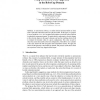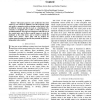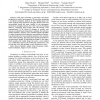614 search results - page 3 / 123 » Robot Navigation Using the Vector Potential Approach |
121
Voted
ROBOCUP
2001
Springer
15 years 6 months ago
2001
Springer
In autonomous robotics, so-called artificial potential fields are often used to plan and control the motion of a physical robot. In this paper, we propose to use an artificial e...
119
click to vote
IJCNN
2006
IEEE
15 years 8 months ago
2006
IEEE
—This paper proposes a new architecture for robot control. A test scenario is outlined to test the proposed system and enable a comparison with an existing system, which is able ...
106
click to vote
IROS
2006
IEEE
15 years 8 months ago
2006
IEEE
Abstract—Network controllers (NCs) are devices that are capable of converting dynamic, spatially extended, and functionally specialized modules into a taskable goal-oriented grou...
108
Voted
IROS
2006
IEEE
15 years 8 months ago
2006
IEEE
— This paper describes a panoramic view-based navigation in outdoor environments. We have been developing a two-phase navigation method. In the training phase, the robot acquires...
113
click to vote
ICRA
2002
IEEE
15 years 7 months ago
2002
IEEE
Dynamical systems theory is used here as a theoretical language and tool to design a distributed control archictecture that generates navigation in formation, integrated with obst...



